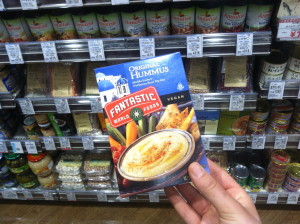Today is May 7th, two months to the day since my arrival in Japan. I knew I’d leave behind major comforts in America, yet I wasn’t ready for the blow I received the very first night.
It was March 7th. After an exhausting journey, our trainer Kyle took my co-trainee and me to a grocery store in Osaka, Japan. Looking around at all the food, thinking of the reasonably comfortable hotel room waiting for me, I felt safe at last. Proceeding to the open refrigerator, I grabbed the first plastic container of a beige substance I saw. “Great,” I said. “Hummus. Looks like I have breakfast for tomorrow.”
“Hummus?” repeated Kyle. “Yeah, you won’t find hummus here.”
Horrified, I dropped the sweetened soy-paste.
Won’t find hummus?
I thought this was a metropolitan country. There’s an Italian restaurant on every street here, and there’s not a corner in Italy – or any Mediterranean country for that matter – without a kebab stand selling hummus for an extra euro.
“Japan is different,” explained Kyle. Mercilessly I might add.
Those 11 days in Osaka were rough. The search continued into Kyoto, after training.
In late March, I received my first visitor from America. Colton, my former roommate on Cape Cod, is the son of a Delta Airlines pilot. One of the job’s benefits allows him to fly for free, as long as there’s room on a flight. Yes, I’m jealous too.
One fine evening, Colton and I traveled to the Sanjo district of Kyoto, a fun and traditional nightlife area. After a brief stop at an Irish bar in which not a single employee or patron spoke any English, we tried the karaoke bar next door. Our mother tongue being the language of a solid majority of Japan’s most popular songs, we thought we’d be welcomed. For the second time, we thought wrong.
Here the Japanese owner(?) of the establishment tried desperately to explain to us why singing karaoke was not available. We still haven’t figured out who he was or what he was trying to say, which is pretty remarkable considering we spent the next two hours with him. He spoke almost no English, yet he was determined to see us satisfied, so he took us to another bar and bought us beers. Japan in a nutshell.
The Middle Eastern bar he brought us to advertised hummus on a portable tripod out front. However I knew better than to ask, having already accosted this establishment in a fit of excitement the night before, only to be told (in a condescending manner which suggested I should have known) that they stopped selling hummus six months earlier. Did I mention the hummus was advertised on a portable tripod out front?
One might think, on this strange tangent of a massive adventure, while I shared a beer with a man whom I could not even share a sentence with, that I would consider not looking for hummus, even for one moment. One would think wrong.
Back on the street, while Colton was busy completely misinterpreting the Japanese man’s reasoning for wanting to take us to a club, my eyes drifted across the beautiful, cherry blossom lined street to a huge sign over a small shop.
Hamid Kebab
“I get it!” came Colton’s distant voice, as I drifted through a field of chickpeas somewhere on the rural Lebanese coast. “You want us to go to the club with you, talk to Japanese girls, and bring them to you!”
“ehhh, 私達は行く、私が払う。” responded a Japanese voice.
“KEBAB!!!” I finally screamed, struggling to keep my voice from cracking, and taking everyone aback.
My eyes finally focused, and lowered to the street, where a portly middle aged Middle Eastern man was standing in front of his life’s work. He raised both his hands and smiled broadly in welcome.
Before Colton could ask what I was doing, I was already across the street, standing speechlessly in front of my savior.
“Where you from?” he asked.
“A – America,” I said. He nodded.
“I from, Iran.”
There was a moment’s silence. “You are from Iran, I am from America,” I said, highly inconclusively.
After another pause, with mutual impulse, we hugged. It was a moment.
“You are American?” he asked. “Your father, Turkish?”
“No, my family is from Lebanon,” I responded.
“Lebanon!” said Hamid, immediately switching to, and babbling in, Arabic. Here and there I understood: “Allah! Allah?”
“No, I speak English,” I said. “And I’m, uhh, Catholic,” not knowing if he was even asking, and thinking it was easier to say than trying to explain widespread millennial religious disaffiliation.
“Oh,” he said, then, pointing at the sign above, “I, Hamid!”
“Nice to meet you.”
“Pharsi? Arabic? Pharsi?” he asked.
“English,” I said again. And not wanting to be a complete disappointment, “and, uhhh, French.”
He stared in confusion.
“Hey!”
The as-yet-unnamed Japanese bar owner had come over, wanting to embrace the excitement. He looked at us and blurted out, “Tequilaaaaa!”
Years of taunts by waspy sailors and best friends alike were enough to know when I’m mistaken for Mexican. As I prepared to angrily insist that Hamid and I descend from the opposite side of the world as Mexico and he should do some research, Hamid himself reemerged from behind his own counter with the same great cry:
“TEQUILA!” He was holding a huge bottle of it.
The next words I thought to say were a quiet “arigatou” as Hamid started passing out shots, while Colton laughed hysterically next to me.
Before the shots could be consumed, a couple of Japanese businessmen walked over to examine the commotion. Hamid was already cooking kebab sandwiches, but within a few seconds of the businessmen’s arrival they too somehow had tequila shots in their hands. He was serving, cooking and drinking at the same time. We then toasted in four languages, owing to Colton’s insistence on saying it in German. Prost!
After a third round of shots, which were enough to make me momentarily forget the bizarre absence of hummus in Hamid’s shop, Colton and I finally started trying to introduce ourselves. It proved very difficult to explain that I worked for AEON, the English school, so I brought up Satomi Ishihara, the beautiful Japanese actress for whom my company’s widespread advertisements are well known.
Finally, Hamid said, “Teacher? You are teacher?”
I affirmed this, and Hamid told the Japanese businessmen, one of whom starts repeating, “Sensei? Sensei!”
The other Japanese businessman added, “You, sensei? Satomi, student?”
Satomi Ishihara in a TV commercial for AEON:
“Well,” I began, pondering how to explain to a man who spoke no English that while Satomi Ishihara is a student in the AEON system, she takes private lessons in Tokyo, whereas I’m a local teacher in Kyoto who they don’t yet trust to take out the garbage. But it wasn’t necessary, as I was interrupted by Colton, who looped one index finger around the other and, moving them back and forth, jovially added “Yeah, ‘student!’”
It was amazing how well this crude joke landed. There followed hysterical laughter in three languages, compounded by mutual amazement that everybody understood the joke. Evidently sexual hand gestures are universal. That may seem obvious, but so did the idea that I’d be able to find fresh hummus in Japan, if only at Middle Eastern restaurants. So did the idea that people in Irish bars speak English. So did being able to karaoke, or paying for tequila. So have a lot of ideas and normal concepts in America seemed universally obvious until I came here.
As this celebration was just passing its prime, an older straggly haired white man with a briefcase sauntered past. This is not a common sight in Japan. I wasted no time.
I chose the words: “YOU SPEAK ENGLISH!”
“Bloody right, I’m from Wales!”
“You must tell me your story,” I continued. “Who are you? Where are you from? Where are you going?”
“To many more English speakers!” he responded excitedly.
We followed him without hesitation. Down the street, down an alley, into a building, up to its second floor. There was a one-room establishment labeled “ING Bar.”
With the name, the large British flags and Rolling Stones posters, the dark wooden setup, the plethora of Brits, and the large beers, this pub was delightfully English. We sat with the Welsh man, two young British tourists from London, a Swedish student, and his Japanese friend. All were fluent in God’s language. Unfortunately they weren’t from God’s country.
For a long time, I listened to the usual banter that America is not keeping up with the rest of the world, patiently wading through the blasphemy:
“Your country is a mess, why don’t they like that nice Obama fellow?”
“Taxes are good thing.”
“Why does your country hate black people?”
“Why aren’t you atheist?”
“Your country loves war.”
Colton was hopeless. A warm-hearted Georgian conservative, he did more harm than good, trying to explain broken right wing theories most people gave up on in 1914. He was floored, and retreated to the bar to flirt with a Japanese girl.
(UPDATE: Colton was displeased with my elitist liberal perception of his role in this event. I actually did hear him discussing atomic bombs with the English-fluent Japanese friend. In Colton’s words: “I would not say I ‘retreated’ to the bar. I had had a fulfilling intellectual conversation, and once that was done how could I not talk to one of the only two girls there? I consider it a brave invasion of enemy lines and my attempt to gain a beachhead.“)
I approached the discussion from a different angle.
To the Swede: “What do you think of Finns?”
“I hate them, they’re Russians,” he responded bitterly.
“Uh huh. And what do you think of Russians?”
There followed a long tirade.
When he finished, I asked, “Do you think you would be able to build a country with Russians, Finns, and Swedes?”
“No.”
“What about people from every other country?”
The blaspheme paused.
“Your country is so very racist!” blurted the now very drunk Welsh man.
“Your country doesn’t have enough black people to show its racism!” I retorted.
They tried to process this for a moment.
“Tell me,” I continued, “How did your country handle racial differences when it ran South Africa?” The Brits started sputtering.
I saw a different approach to eviscerating their condescending superiority complex to Americans. Like Optimus Prime, I took them on all on at once, to restore American exceptionalism. Overcoming hatred and intolerance is the American cross to bear.
Here is the debate as it was filmed by Colton:
By the end of it, the Welsh man was screaming at me to shut up, which I took as him admitting the truth: The afterburns of the melting pot will soon cool, and the American super race of all ethnicities combined will be born. They all believe this and I assume are now back home sharing the news with their countrymen. And that’s how it happened.
But alas, none of them knew where to find hummus. Nonetheless I soon discovered the goopish gold in powdered form at an import shop. Missing you, Bay Sweets, West Roxbury.
Hell I even miss the 7/11 Sabra hummus at this point.
–
Thank you for reading. There will be more from this country soon, including some severely more Japanese experiences. You can see many more pictures on Instagram @gregnasif, or see more frequent updates on Twitter, also @gregnasif.


Amazing.